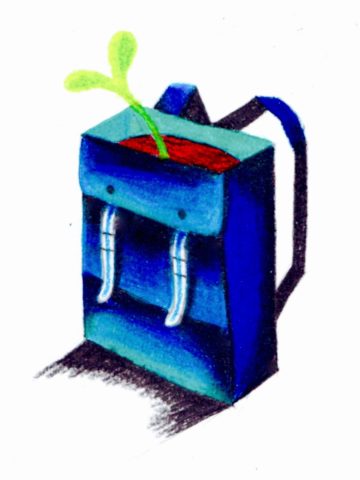The announcement of a federal carbon tax in October 2016 has stirred up many a mixed emotion. Whether you agree with the carbon tax or not, there are small changes one can make in their day-to-day school life to make a difference in the environment and save a buck while doing it.
Transportation
As students, we receive a heavily discounted bus pass which is included in the price of our tuition. Why not use it? If you’re fortunate enough to have a car, it’s often tempting to just drive to school and park, especially on those brutally cold Saskatchewan winter days. However, taking the bus will not only reduce your carbon footprint but also save you money in the long run.
Better yet, if you’re even more fortunate, you might live close enough to the university to just walk to your classes. Yes, risking your life in a blizzard to get  somewhere may seem unnecessary, but our cavemen and cavewomen ancestors did it. So can you. Disclaimer: don’t risk your life in a blizzard.
somewhere may seem unnecessary, but our cavemen and cavewomen ancestors did it. So can you. Disclaimer: don’t risk your life in a blizzard.
Food
Two simple suggestions come to mind for this one. First, instead of packing your lunch in a Ziploc bag, bring your leftover stroganoff in a container that you can bring home and clean out to use again the next day. It’ll probably be easier to eat that way too. Yes, it’s a pain in the ass to clean and dry those annoying containers, but it reduces waste and, again, in the long run it’ll save you more money.
Another tip for reducing your food-related carbon footprint on campus has to do with that beloved black liquid we all crave. I’m not talking about Texas light sweet crude, but I am referring to every student’s favourite go-go juice: coffee.
If you find yourself frequently purchasing coffee on campus, make some at home and bring it in a mug. Then, when you require your subsequent 14 cups of coffee to get you through the day, take it to your favourite coffee shop and ask them to fill it for you. Most shops will fill mugs and often offer a financial incentive to do so in the form of a small discount.
Go digital
You’ve eco-commuted to school, ate your eco-lunch and downed nine cups of eco-coffee, but it’s now 3 p.m. and time to actually start studying. When you’re sitting in the library hammering out notes for that midterm, how do you do it? If you have a laptop, take notes with it!
If you don’t have a laptop, use a campus computer and take advantage of the free cloud storage offered to every student. Typing notes is a lot faster than writing for most and does reduce the amount of year-end atmospheric pollution resulting from class-note bonfires. I’m sure there’s a statistic for that somewhere, just Google it.
Other ways that technology can reduce paper waste is through the use of smartphone apps for making lists or keeping track of important dates. I used to go through a stack of sticky notes faster than a student cramming for an exam goes through a still-plastic-wrapped textbook, but thanks to technology, I’m now producing less waste and saving money on my car insurance — indirectly of course, due to savings realized on the purchase of sticky notes.
Recycle
There’s one last thing you can do on campus before heading home after a long day of being an eco-student. Recycle all that crap left over from your day if you’ve been forgetful and didn’t do any of the above. It happens to us all. You overslept, didn’t have time to make a breakfast, lunch or coffee and in your haste and left your laptop in that corner where you keep your laptop.
The university does a great job of providing ample opportunities on campus to recycle paper, plastics and other materials in bins located right next to trash bins. Recycle your waste and do the planet a solid.
If you already do these things, great. If not, give them a try. They’ll help you play your part in living a greener lifestyle and also save you many dollars which can be exchanged for other goods, such as beer.
—
Bodan Worobetz
Graphic: Laura Underwood / Layout Manager